|
|
|
Sort Order |
|
|
|
Items / Page
|
|
|
|
|
|
|
| Srl | Item |
| 1 |
ID:
166604


|
|
|
|
|
| Summary/Abstract |
The upsurge in post-Cold War coalition operations has stimulated research on caveats: national reservations on the use of force in multinational military operations. However, because the concept of caveats has no agreed-upon definition, it is used inconsistently. This in turn impedes comparing research findings across academic and policy studies and therefore systematic research. This article is a contribution to the scholarly debate on how the analytical concept of caveats are to be delimited. Crucially, we argue that caveats result from some calculated political decision, and should not be confused with reserved behavior due to financial and technical limitations, or lack of coordination. We suggest that caveats are empirically observed and measured in two ways: First, we argue that coalition rules of engagement should be used as a yardstick for measuring direct reservations on the use of force. Second, we suggest reservations on task-assignment and geographical mobility should be used to register indirect reservations.
|
|
|
|
|
|
|
|
|
|
|
|
|
|
|
|
| 2 |
ID:
166607
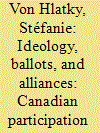

|
|
|
|
|
| Summary/Abstract |
The decision to employ force abroad is often a contentious political decision, where partisanship plays a crucial role. Prior to military intervention, political parties usually make their ideologically distinctive preferences clear and seek to implement them once in power. What remains unclear, however, is how ideology affects the decision to use military force. This article contends that alliance and electoral calculations constrain the ability of political parties to implement their ideological preferences with regards to the use of force. It examines a “most likely” case for the partisan theory of military intervention, namely Canada’s refusal to take part in the invasion of Iraq and its decision to commit forces to the war against the Islamic State. It finds that only in combination with alliance and electoral calculations does executive ideology offer valuable insights into Canada’s military support to U.S.-led coalition operations, which contributes to our understanding of allied decision-making.
|
|
|
|
|
|
|
|
|
|
|
|
|
|
|
|
| 3 |
ID:
166605
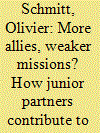

|
|
|
|
|
| Summary/Abstract |
There is a growing consensus that multinational military operations are often less effective than the theoretical sum of their constitutive parts. Multiple chains of command, restriction on intelligence sharing, and capability aggregation problems can reduce fighting power. However, partners may be necessary to provide legitimacy to an intervention. As such, most studies assume that the state leading a coalition (usually the United States) has to accept a degree of operational ineffectiveness in order to gain political benefits from the participation of junior partners to a multinational military operation. However, such analysis puts all junior partners under the same category, without taking into account the differentiated contributions of those junior partners based on their relative military power and international status. This article explores variation between the junior partners’ contributions and their impact on coalition political and military dynamics. It teases out the implications of adopting a fine-grained analysis of junior partners.
|
|
|
|
|
|
|
|
|
|
|
|
|
|
|
|
| 4 |
ID:
166603
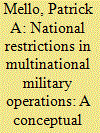

|
|
|
|
|
| Summary/Abstract |
Recent scholarship in security studies has started to explore the causes and consequences of various forms of national restrictions in multinational military operations (MMOs). This article makes a conceptual contribution to this literature by developing a theoretical framework of national restrictions in MMOs that distinguishes between structural, procedural, and operational restrictions. I argue that these types of restrictions are governed by different causal mechanisms. Structural restrictions are relatively stable over time and effect deployment decisions irrespective of other factors. Procedural restrictions, on the other hand, can constitute veto points against deployment only in combination with distinct political preferences. Finally, operational restrictions directly affect the rules of engagement of troop contributing countries. The article illustrates the three types of restrictions and their interaction with empirical examples from a range of countries and sketches their impact on MMO deployment decisions and mandates.
|
|
|
|
|
|
|
|
|
|
|
|
|
|
|
|
| 5 |
ID:
166606
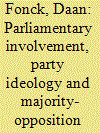

|
|
|
|
|
| Summary/Abstract |
This article examines the impact of parliamentary involvement in troop deployment decisions on restrictions on military mandates by examining the Belgian contribution to the 2011 Libya intervention and the coalition against the self-proclaimed Islamic State. More specifically, we analyse (1) the effect of party ideology on mandate preferences, and (2) the impact of bargaining between majority and opposition parties on the outcome of mandate negotiations. Our case study demonstrates that left-wing parties show a strong inclination toward imposing restrictions on the use of military force beyond humanitarian goals, while right-wing preferences tend to depend on the national interests at stake in the operation. With regard to majority-opposition bargaining, our study shows that the impact of opposition parties is dependent on the degree of contention between government and opposition parties, as well as on the extent to which the executive needs to seek support across its own majority.
|
|
|
|
|
|
|
|
|
|
|
|
|
|
|
|
| 6 |
ID:
166602
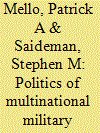

|
|
|
|
|
| Summary/Abstract |
Today, few countries fight alone; most fight as allies or partners in multilateral campaigns. The end of the Cold War opened a window of opportunity for multinational military operations (MMOs). These have seen varying degrees of participation, enthusiasm, and success. This special forum is devoted to the politics of multilateral warfare including their formation, maintenance, and durability. The introduction sketches past research and derives some key questions of continuing relevance. The contributions shed light on the domestic and international politics of MMOs, focusing on the implementation of national restrictions and their repercussions for MMOs, party politics of military intervention, the conditions under which states decide to defect from military operations, and the role of junior partners in MMOs. In sum, this forum offers a fresh look at the politics of MMOs, including conceptual contributions to the study of national restrictions, domestic constraints, and coalition warfare.
|
|
|
|
|
|
|
|
|
|
|
|
|
|
|
|
| 7 |
ID:
166601


|
|
|
|
|
| Summary/Abstract |
This article investigates how strategic culture influenced the decision-making of Australia and Poland regarding the global coalition against the Islamic State. In the coalition, Australia has followed its tradition of active participation in United States-led operations, while Poland has embarked on a more cautious line, thereby breaking with its previous policy of active participation. The article examines how Australian and Polish responses to the coalition were shaped by five cultural elements: dominant threat perception, core task of the armed forces, strategic partners, experiences of participating in coalitions of the willing, and approach to the international legality of expeditionary operations. It finds that Australia and Poland differed on all five elements but that the major differences are found in dominant threat perception and core task of the armed forces.
|
|
|
|
|
|
|
|
|
|
|
|
|
|
|
|
| 8 |
ID:
166608


|
|
|
|
|
| Summary/Abstract |
How do states defect from multinational military coalitions? The question deserves considerable academic scrutiny, as states increasingly rely on coalitions to prosecute military missions. Yet to the extent that coalition defection has been explored, the extant literature tends to see defection as a binary undertaking – states are either in or out. In practice, however, defection is an act of risk minimization in a manner that forces other coalition partners to fill resulting operational gaps. A coalition can therefore appear stable due to a constant number of flags associated with the mission, but in practice be much less coherent and capable. After defining defection as a non-routine abrogation of operational responsibility at other coalition partners’ expense, significantly prior to mission conclusion, this article explores several states’ participation in Operation Iraqi Freedom and the various manners by which they defected from that coalition. It concludes with implications for future scholarship.
|
|
|
|
|
|
|
|
|
|
|
|
|
|
|
|
|
|
|
|
|